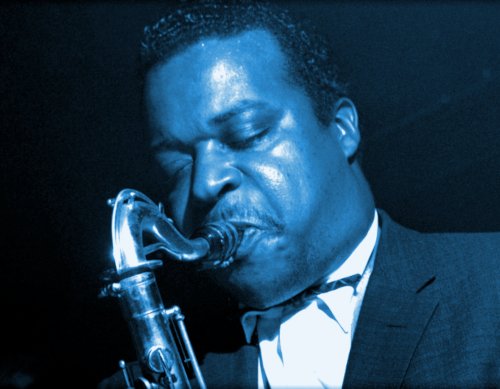Biography
Eugene "Gene" Ammons, affectionately known as "Jug," was born on April 14, 1925, in Chicago, Illinois. He grew up in a musical household, as his father, Albert Ammons, was a renowned boogie-woogie pianist and a major influence on his early exposure to music. Gene began playing the tenor saxophone in high school, quickly displaying a natural talent that set him apart from his peers.
Ammons gained early recognition in 1943 when he joined the band of trumpeter King Kolax. His big break came shortly thereafter, when he joined Billy Eckstine’s innovative big band. Eckstine’s orchestra was a breeding ground for bebop pioneers, featuring luminaries such as Charlie Parker, Dizzy Gillespie, and Sarah Vaughan. Amidst such towering figures, Ammons made his mark with his rich, blues-infused tone and powerful, expressive playing.
In the late 1940s, Ammons embarked on a solo career, forming his own small groups and establishing himself as a versatile musician. While he could hold his own in fast-paced bebop settings, he also excelled in soulful ballads, a genre where his deep, resonant sound truly shined. He recorded prolifically for labels like Prestige Records, producing both instrumental masterpieces and popular crossover hits.
A notable aspect of Ammons' career was his frequent collaborations with fellow saxophonist Sonny Stitt. Their spirited "tenor battles" are legendary, with both musicians pushing each other to new creative heights. This partnership resulted in numerous memorable recordings that showcased their contrasting yet complementary styles.
Despite his musical success, Ammons' life was marked by personal challenges. He faced legal troubles and served two significant prison sentences during the 1950s and 1960s related to drug possession. These interruptions slowed his career but did not diminish his impact on the jazz world. Upon his release in the late 1960s, Ammons returned with renewed energy, recording a series of albums that solidified his reputation as a pioneer of soul jazz. His later works, blending blues, gospel, and R&B elements, resonated with audiences and influenced a generation of musicians.
Tragically, Ammons' life was cut short when he passed away on July 23, 1974, due to bone cancer. However, his legacy lives on in his extensive discography, which continues to inspire saxophonists and jazz enthusiasts worldwide. Gene Ammons remains a symbol of resilience and creativity, a musician who bridged the gap between bebop, blues, and soul, leaving an indelible mark on jazz history.
Buy Gene Ammons Music on Amazon
Notable Recordings
- "My Foolish Heart" (1950): This track showcases Ammons' lyrical ability and his mastery of ballad playing. His warm tone and emotive phrasing make this a definitive recording in his career.
- "Hittin' the Jug" (1961): A quintessential example of Ammons' soul jazz style, this tune features a groovy, bluesy vibe that became a hallmark of his work. It's a fan favorite for its infectious energy.
- "Red Top" (1953): A collaboration with Sonny Stitt, this recording highlights Ammons' ability to trade lines with other virtuosos, creating an electric, dynamic performance.
- "Canadian Sunset" (1960): This track reflects Ammons' gift for reinterpreting popular standards, infusing them with jazz sophistication and soulful depth.
- "Juggin' Around" (1962): A lively and playful piece that underscores his nickname, "Jug," and his ability to make music that feels both relaxed and engaging.
